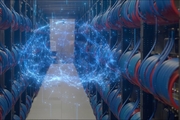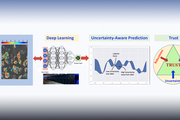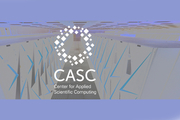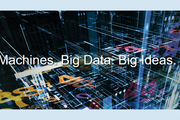Did you know we have a monthly newsletter? View past volumes and subscribe.
Igniting scientific discovery with AI and supercomputing (VIDEO)
April 15, 2024 -
LLNL’s fusion ignition breakthrough, more than 60 years in the making, was enabled by a combination of traditional fusion target design methods, high-performance computing (HPC), and AI techniques. The success of ignition marks a significant milestone in fusion energy research, and was facilitated in part by the precision simulations and rapid experimental data analysis only possible through...
Predicting climate change impacts on infrastructure (VIDEO)
Feb. 26, 2024 -
At LLNL, electrical grid experts and climate scientists work together to bridge the gap between infrastructure and climate modeling. By taking weather variables such as wildfire, flooding, wind, and sunlight that directly impact the electrical grid into consideration, researchers can improve electrical grid model projections for a more stable future. In a new video, LLNL computer scientist...
High-performance computing, AI and cognitive simulation helped LLNL conquer fusion ignition
June 21, 2023 -
For hundreds of LLNL scientists on the design, experimental, and modeling and simulation teams behind inertial confinement fusion (ICF) experiments at the National Ignition Facility, the results of the now-famous Dec. 5, 2022, ignition shot didn’t come as a complete surprise. The “crystal ball” that gave them increased pre-shot confidence in a breakthrough involved a combination of detailed...
Data science meets fusion (VIDEO)
May 30, 2023 -
LLNL’s historic fusion ignition achievement on December 5, 2022, was the first experiment to ever achieve net energy gain from nuclear fusion. However, the experiment’s result was not actually that surprising. A team leveraging data science techniques developed and used a landmark system for teaching artificial intelligence (AI) to incorporate and better account for different variables and...
Patent applies machine learning to industrial control systems
May 8, 2023 -
An industrial control system (ICS) is an automated network of devices that make up a complex industrial process. For example, a large-scale electrical grid may contain thousands of instruments, sensors, and controls that transfer and distribute power, along with computing systems that capture data transmitted across these devices. Monitoring the ICS network for new device connections, device...
Skywing: Open-source software aids collaborative autonomy applications
Jan. 25, 2023 -
A new software developed at LLNL, and known as Skywing, provides domain scientists working to protect the nation’s critical infrastructure with a high-reliability, real-time software platform for collaborative autonomy applications. The U.S. modern critical infrastructure—from the electrical grid that sends power to homes to the pipelines that deliver water and natural gas and the railways...
New HPC4EI project to create 'digital twin' models for aerospace manufacturing
Jan. 19, 2023 -
A partnership involving LLNL aimed at developing “digital twins” for producing aerospace components is one of six new projects funded under the HPC for Energy Innovation (HPC4EI) initiative, the Department of Energy’s Office of Energy Efficiency and Renewable Energy announced. Sponsored by the HPC4Manufacturing (HPC4Mfg) Program, one of the pillars of HPC4EI, the collaboration between LLNL...
An open-source, data-science toolkit for energy: GridDS
Aug. 2, 2022 -
As the number of smart meters and the demand for energy is expected to increase by 50% by 2050, so will the amount of data those smart meters produce. While energy standards have enabled large-scale data collection and storage, maximizing this data to mitigate costs and consumer demand has been an ongoing focus of energy research. An LLNL team has developed GridDS—an open-source, data-science...
Defending U.S. critical infrastructure from nation-state cyberattacks
July 21, 2022 -
For many years, LLNL has been conducting research on cybersecurity, as well as defending its systems and networks from cyberattacks. The Lab has developed an array of capabilities to detect and defend against cyberintruders targeting IT networks and worked with government agencies and private-sector partners to share its cybersecurity knowledge to the wider cyberdefense community. LLNL has...
Building confidence in materials modeling using statistics
Oct. 31, 2021 -
LLNL statisticians, computational modelers, and materials scientists have been developing a statistical framework for researchers to better assess the relationship between model uncertainties and experimental data. The Livermore-developed statistical framework is intended to assess sources of uncertainty in strength model input, recommend new experiments to reduce those sources of uncertainty...
Laser-driven ion acceleration with deep learning
May 25, 2021 -
While advances in machine learning over the past decade have made significant impacts in applications such as image classification, natural language processing and pattern recognition, scientific endeavors have only just begun to leverage this technology. This is most notable in processing large quantities of data from experiments. Research conducted at LLNL is the first to apply neural...
The data-driven future of extreme physics
May 19, 2021 -
By applying modern machine learning and data science methods to “extreme” plasma physics, researchers can gain insight into our universe and find clues about creating a limitless amount of energy. In a recent perspective published in Nature, LLNL scientists and international collaborators outline key challenges and future directions in using machine learning and other data-driven techniques...
CASC research in machine learning robustness debuts at AAAI conference
Feb. 10, 2021 -
LLNL’s Center for Applied Scientific Computing (CASC) has steadily grown its reputation in the artificial intelligence (AI)/machine learning (ML) community—a trend continued by three papers accepted at the 35th AAAI Conference on Artificial Intelligence, held virtually on February 2–9, 2021. Computer scientists Jayaraman Thiagarajan, Rushil Anirudh, Bhavya Kailkhura, and Peer-Timo Bremer led...
DOE announces five new energy projects at LLNL
Nov. 13, 2020 -
The DOE today announced two rounds of awards for the High Performance Computing for Energy Innovation Program HPC4EI), including five projects at LLNL. HPC4EI connects industry with the computational resources and expertise of the DOE national laboratories to solve challenges in manufacturing, accelerate discovery and adoption of new materials and improve energy efficiency. The awards were...
LLNL papers accepted into prestigious conference
July 9, 2020 -
Two papers featuring LLNL scientists were accepted in the 2020 International Conference on Machine Learning (ICML), one of the world’s premier conferences of its kind. Read more at LLNL News.
Deep learning may provide solution for efficient charging, driving of autonomous electric vehicles
Feb. 4, 2020 -
LLNL computer scientists and software engineers have developed a deep learning-based strategy to maximize electric vehicle (EV) ride-sharing services while reducing carbon emissions and the impact to the electrical grid, emphasizing autonomous EVs capable of offering 24-hour service. Read more at LLNL News.
Department of Energy researchers share data management strategies at first-ever “Data Day”
Nov. 11, 2019 -
It’s become something of a mantra of the digital age: Data is the new currency. Especially in science, where it’s hard to find a single project that doesn’t involve generating or consuming massive amounts of data.
In light of the growing awareness of the critical importance of data management across the Department of Energy complex, more than 100 researchers from DOE national laboratories...
LLNL Center for Applied Scientific Computing: accelerating scientific discovery (VIDEO)
July 12, 2019 -
The Center for Applied Scientific Computing (CASC) serves as LLNL’s window to the broader computer science, computational physics, applied mathematics, and data science research communities. Major thrust areas in CASC research include: (1) Increasing simulation fidelity by integrating multi-physics and multi-scale models, increasing resolution through advanced numerical methods and more...
CASC research showcased at major data science venues
March 20, 2019 -
Researchers from LLNL’s Center for Applied Scientific Computing (CASC) are among the Lab’s employees making waves in the data science community, with many prominent accolades, publications, and acceptances in 2018. Data science encompasses some of the hottest technology topics—machine learning (ML), “big data” analysis, artificial intelligence, computer vision, and more—and the Center’s...
New Data Science Institute supports explosive growth of data science
March 8, 2018 -
The Data Science Institute (DSI) is a new multidisciplinary entity supporting growth in this field both across Lawrence Livermore National Laboratory (LLNL) programs and among the external data science community. The DSI is designed to facilitate mission-driven data science through a cohesive vision, increased collaboration, and targeted outreach and recruiting. The DSI is led by Michael...






















